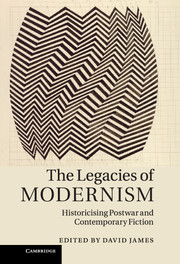Book contents
- Frontmatter
- Contents
- Notes on contributors
- Acknowledgements
- Introduction: mapping modernist continuities
- Part I Early legacies: inheriting modernism at mid century and beyond
- Chapter 1 Not what it used to be: nostalgia and the legacies of modernism
- Chapter 2 H. E. Bates, regionalism and late modernism
- Chapter 3 Moving beyond modernism in the fiction of B. S. Johnson: charting influences and comparisons
- Part II Modernist aesthetics in transition: character, perception, innovation
- Part III Reassessing the ethics of modernist fiction
- Part IV Modernism's global afterlives
- Epilogue Finding the dreadfully real
- Index
- References
Chapter 3 - Moving beyond modernism in the fiction of B. S. Johnson: charting influences and comparisons
from Part I - Early legacies: inheriting modernism at mid century and beyond
Published online by Cambridge University Press: 05 November 2011
- Frontmatter
- Contents
- Notes on contributors
- Acknowledgements
- Introduction: mapping modernist continuities
- Part I Early legacies: inheriting modernism at mid century and beyond
- Chapter 1 Not what it used to be: nostalgia and the legacies of modernism
- Chapter 2 H. E. Bates, regionalism and late modernism
- Chapter 3 Moving beyond modernism in the fiction of B. S. Johnson: charting influences and comparisons
- Part II Modernist aesthetics in transition: character, perception, innovation
- Part III Reassessing the ethics of modernist fiction
- Part IV Modernism's global afterlives
- Epilogue Finding the dreadfully real
- Index
- References
Summary
In the context of B. S. Johnson's compulsive urge toward literary innovation evident throughout his fiction, this essay explores various potential influences, including cultural contexts. I will examine several interwoven elements: first, precursors and literary models that seemingly inspired Johnson, second, certain specific legacies of modernism and third, Johnson's relation to contemporaneous writers also considered experimental. Doing so will reveal aspects of the nature and meaning of Johnson's innovations, techniques and aesthetic dispositions. Very different conceptual models may permeate his work, but one avant-garde aspect militates against his well-recognised struggle for a wider truthfulness, for as Gabriel Josipovici suggests, experimental fiction's overriding impulses reject verisimilitude and counter any illusion of the real precisely by admitting doubt and negating stock meanings, tentatively suggesting the unknowable and unsayable. Although committed to a larger concept of truth, ideologically Johnson accepted randomness as central to experience, as is exemplified in his polemical introduction to Aren't You Rather Young to be Writing Your Memoirs? (1973):
Life does not tell stories. Life is chaotic, fluid, random; it leaves myriads of ends untied, untidily. . . . Change is a condition of life. Rather than deplore this, or hunt the chimæræ of stability or reversal, one should perhaps embrace change as all there is. Or might be. For change is never for the better or worse; change simply is.
In the postwar period many British critics and academics – reflecting their rather narrow and parochial perspectives – considered formal and stylistic innovation in fiction as passé, associated with pre-war experimental modernists such as James Joyce, Ford Maddox Ford and Virginia Woolf. Rather than dismissing modernist legacies, one might now reconsider whether postwar experimentalists like Johnson were influenced more subtly, sharing certain deeply rooted aesthetic instincts with modernism. Certainly, such postwar writers embrace modernism's rejection of reductive models of writing, its opposition to naturalism's correspondence model of realism. In Albert Angelo (1964) Johnson explicitly distances himself from certain dominant modes of postwar fiction, including the moralistic social realism and interventionism exemplified by E. R. Braithwaite's To Sir, With Love (1959), openly mocked by Johnson's protagonist. Like modernist precursors, many postwar experimental novels adopt formal devices precisely to challenge generic conventions. However, such fiction is differently inflected, highlighting issues of engagement and possibilities of synthesising the experimental with existential authenticity, which means such fiction broadly diverges from the commitment to an experiential mimesis of consciousness typical of many modernists. Johnson exemplifies this difference, significantly foregrounding his proletarian origins, fusing an ideological consciousness with a reflexive approach to formal innovation, blending an acute sense of social awareness, alienation and existential crisis. His class-consciousness radicalises his aesthetics.
- Type
- Chapter
- Information
- The Legacies of ModernismHistoricising Postwar and Contemporary Fiction, pp. 53 - 72Publisher: Cambridge University PressPrint publication year: 2011



